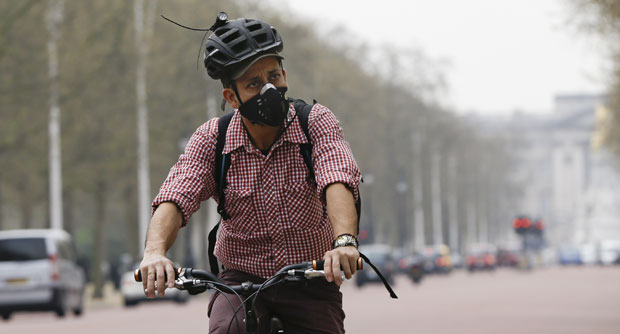Sahara dust storm brings smog to Britain

A cyclist wears an anti air pollution mask as he cycles along The Mall in London, Wednesday, April 2, 2014. AP
LONDON — European pollution and dust swirling in from the Sahara created a “perfect storm” of smog in Britain on Wednesday, April 2, prompting authorities to warn people with heart or lung conditions to cut down on tough physical exercise outdoors.
Air pollution in some areas reached the top rung on its 10-point scale, the environment department said.
The smog was caused by pollution from Britain and industrialized areas of the continent — trapped in place because of light winds — mixing with dust blown up from a storm in the Sahara desert.
Many motorists across England awoke this week to find cars covered in a film of red dust left by overnight rain.
Paul Cosford of Public Health England told the BBC that people with heart or respiratory problems should “reduce the amount of strenuous exercise outdoors over the next few days.”
Article continues after this advertisementAn unusual combination of factors had conspired “to create a ‘perfect storm’ for air pollution,” according to Helen Dacre, a meteorologist at the University of Reading.
Article continues after this advertisement“Toxic gases, such as nitrogen dioxide and ozone, as well as fine dust particles in the air blown in from the Sahara and from burning fossil fuels, all contribute to cause problems for people with heart, lung and breathing problems, such as asthma,” she said.
Despite efforts to make industry and automobiles cleaner, air pollution remains a major problem in Britain and across Europe.
Last month, Paris took the drastic step of banning half the city’s cars from the roads for a day after a week in which pollution levels exceeded those in notoriously smoggy cities including Beijing and Delhi.
Air pollution is the world’s single biggest environmental health risk, responsible for about one in eight deaths, the World Health Organization said last week.
Air pollution kills about 7 million people worldwide every year, with more than half of the fatalities due to fumes from indoor stoves and the rest from outdoor pollutants, the WHO said.